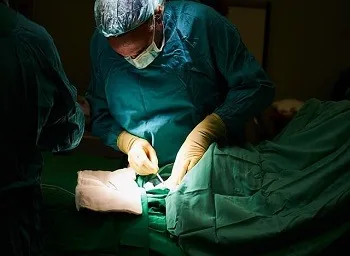Blood Transfusion for a Femur Fracture
I’m Ed Smith, a Sacramento Personal Injury Lawyer. When someone is involved in an auto accident, there are a variety of injuries that they can sustain. One of these is a broken femur, which is called a femur fracture. There are many ways that someone can fracture their femur; however, in an auto accident, the femur is fractured through direct trauma. Whether it is a rear-end collision or a T-bone, forces can be transmitted via the legs. These forces can fracture the femur, which is one of the largest bones in the body. Some of the statistics published on femur fractures by Up To Date include:
- The annual incidence of a fracture occurring in the middle of the femur is about 10 per 100,000 people per year
- The incidence of fractures in the femur is highest among teenagers and the elderly
- The most likely reason why an adult sustains a femur fracture is in an auto accident
- Femur fractures in children are often indicative of child abuse
There are many different types of femur fractures, and one of these is an open fracture. When someone has been diagnosed with an open femur fracture, this means that a part of the bone has broken through the surface of the skin. When this happens, blood vessels can be ruptured which could lead to a significant amount of bleeding. Because blood is essential to life, someone who has lost a lot of blood may need a blood transfusion. Why is this required and what are the risks?
Risks of Receiving a Blood Transfusion
When the doctor says that someone needs a blood transfusion for an open fracture, such as that of the femur, this can be a scary proposition. It is important to understand the risks of receiving a blood transfusion for a bone fracture. Some of these risks include:
- Infection: Even though the blood products are irradiated to kill bacteria and viruses, the risk of infection is still possible; however, this is exceedingly rare.
- Reaction: Some individuals might be allergic to some of the products in the blood, which could lead to anaphylaxis.
- Mismatch: Even though most people have heard of the A, B, and O blood types, there are many other proteins that must be matched. Sometimes, it is hard to find a perfect match. A mismatch could lead to a bad reaction.
- Low Calcium: Blood products have citrate in them to preserve them. Citrate binds up the body’s stores of calcium. Low calcium could lead to heart failure.
Benefits of a Blood Transfusion
On the other hand, blood transfusions are performed all the time and are sometimes necessary to save someone’s life. If someone is bleeding from an open femur fracture or has low hemoglobin following an operation, a blood transfusion could be necessary. This will restore the body’s ability to carry oxygen, help them recover more quickly, and could even save their life. After the transfusion is done, lab values are typically checked to make sure that the hemoglobin has increased high enough. If another transfusion is needed, more could be given. Ultimately, whether or not someone needs a blood transfusion following a fracture of the femur is up to the physician; however, people with open fractures and those who require surgery will often need extra blood.
Sacramento Personal Injury Lawyer
I’m Ed Smith, a Sacramento Personal Injury Lawyer. Suffering a femur fracture after an auto accident can be a severe, life-changing experience. If you or a loved one have suffered a femur fracture due to an accident, please feel free to call me at (916) 921-6400 or toll-free at (800) 404-5400 for free, friendly advice.
Everyone is encouraged to go on Yelp, Avvo, and Google to see reviews from our past clients.
I am proud to be a member of the Million Dollar Advocates Forum.
Viewers can look over many of our verdicts or settlements.
Image Attribution: The image at the beginning of this article was seen first on Unsplash. The picture has been printed here with permission
:dr ds [cs 685] cv

